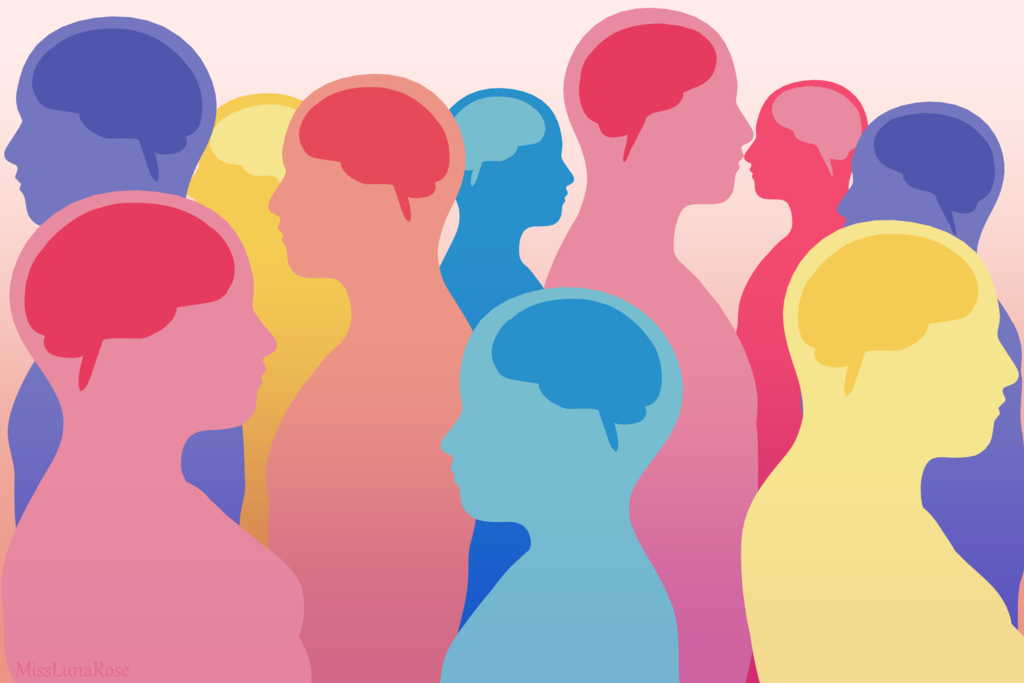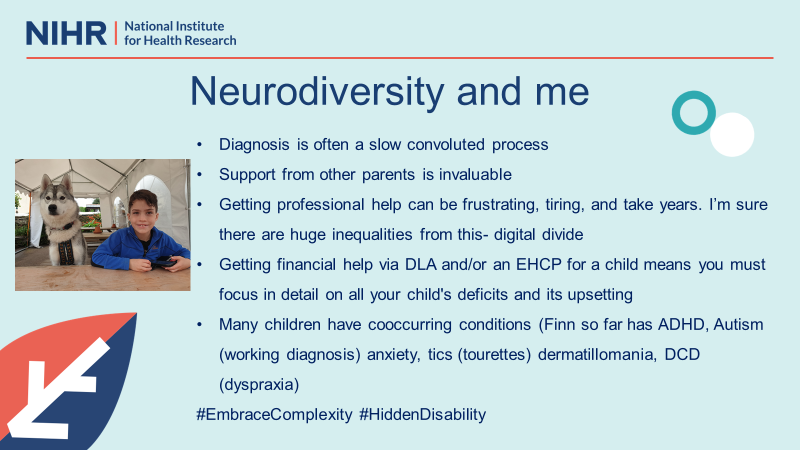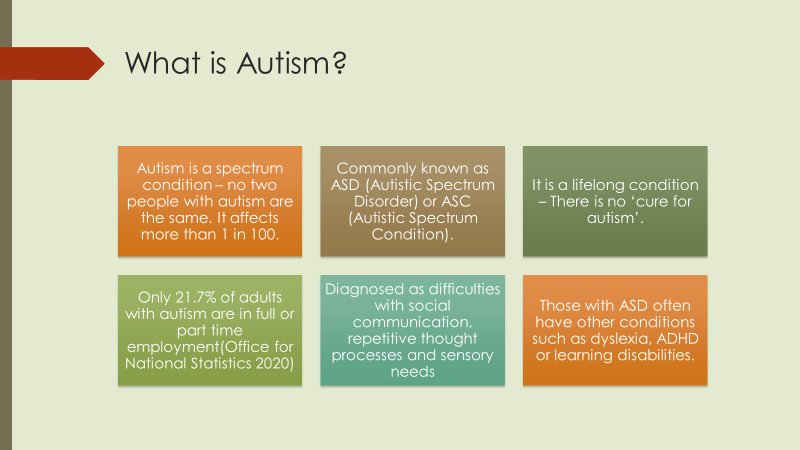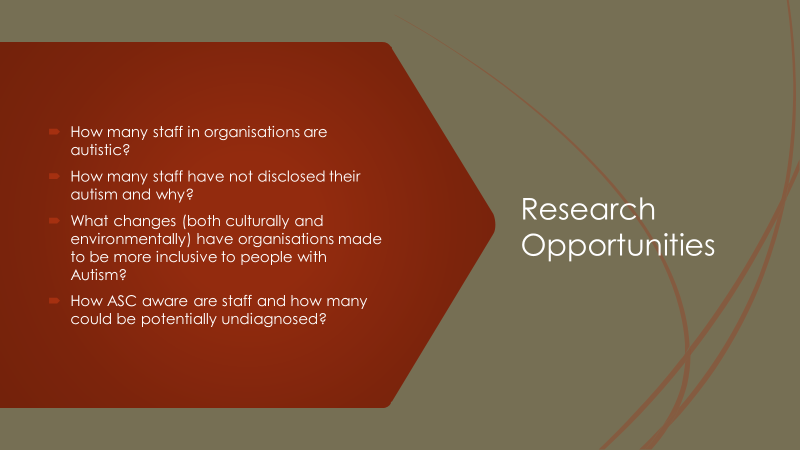Seldom Heard Voices Forum: Neurodiversity

02.09.21
Selina Wallis, ARC NWC Public Involvement Manager
Our third ARC NWC Seldom Heard Forum focused on Neurodiversity.
Neurodiversity refers to any neurodevelopmental (lifelong) condition, which affects the brain and influences how people think, perceive the world or interact with others. Neurodiversity is considered a hidden disability (not immediately detectable by looking at or talking to someone. These also include mental health conditions as well as mobility, sensory loss or physical disabilities that cause pain, fatigue or impacts on movement).
Neurodiversities include ADHD, autism, developmental language disorder, Downs Syndrome, dyslexia, dyspraxia, epilepsy, foetal alcohol spectrum disorder, learning disability and Tourette Syndrome amongst many others and effects 1 in 5 people.
“Rooted in the social model of disability, neurodiversity sees disability as entrenched in society rather than the individual, and proponents of the neurodiversity movement want to make it easier for all neurodiverse people to be able to contribute to society as they are rather than how society would want them to. This means looking at the strengths of difference” (Mel Green, Open University https://www.open.edu/openlearn/health-sports-psychology/mental-health/neurodiversity-what-it-and-what-does-it-look-across-races
There are 10,000,000 people in the UK living with a neurological condition which has a significant impact on their lives. Over 1,000,000 people (2% of the UK population) are disabled by their neurological condition. Approximately 850,000 people in the UK care for someone with a neurological condition.
Comorbidity is common, meaning that people with one neurodiverse condition often have others. But ADHD and ASD were not formally recognised diagnostically as co-occurring conditions until the Diagnostic and Statistical Manual of Mental Disorders 5 (DSM-5) was published in 2013. Hence, awareness and understanding of both conditions when they co-occur is less established and there is little guidance in the clinical literature. https://bmcmedicine.biomedcentral.com/articles/10.1186/s12916-020-01585-y )
Health inequalities exist for people with neurodiversity for many reasons including delayed or misdiagnosis, education, access to services and societal norms. In addition, Covid-19 has widened the inequalities faced by autistic and other neurodiverse people. Historically research on neurodiversity has not been coproduced with community members, and public involvement in health research is less likely to be shaped by people with neurodiversity which is something ARC NWC has actively worked against. Working with people with neurodiversity in our research
https://arc-nwc.nihr.ac.uk/wp-content/uploads/2020/10/4-Easy-read-literature-review.pdf
This forum was convened to look at some of the services working in this area in the North West. There were approximately 60 attendees from across the region and sector. Presenting was ARC Public involvement team Selina Wallis, Shaima Hassan, Ruth Ball and Public Adviser Naheed Tahir.
First to speak was Carolyn Litherland, ADHD North West. Established in 1995, ADHD North West was formed to provide information, advice, guidance, and support to individuals and families affected by Attention Deficit Disorders and associated conditions throughout the north west region. They are commissioned by several CCGs to provide a helpline, information, family support, parenting training and workshops for professionals.
We heard about how support has had to move online through lockdown and that courses are not as yet codesigned with children or adults with ADHD.
In the Q and A we heard that ADHD researchers estimate that by age 12, children with ADHD get 20,000 more negative messages about themselves than other kids their age. In the past ADHD was under diagnosed (and still is in some areas) as children are labelled naughty or impulsive or daydreamers. ADHD can present and be understood differently by sex and ethnicity. (With boys and black children more often diagnosed).
We heard how parents in Liverpool can get support from the ADHD foundation and Merseyside Youth Association. Another participant talked about Youth Connect, a course which I have personally done and found very helpful in supporting mental health.
“I think with any form of being neurodivergent the important thing is everything is led by people who are ADHD, autistic, dyspraxic etc, we get left out a lot”
People asked: What work is being done with ADHD diagnosed in young adulthood? is that through a different service?
ADHD is common in families and many parents only discover they probably have undiagnosed neurodiverse conditions when their children are diagnosed and as they learn more about the differences and effects on everyday life.
“I think it’s always good (funding pending) to have lived experiences involved too whenever possible. In autism research, parents have a very different (albeit still useful) perspective than the individuals themselves” (audience member)
There was concern about the use of words like ‘dysfunctional’ for neurodiverse children an ‘difficult’. With strengths based approaches being seen as more appropriate.
Carolyn talked about the work they do in schools with teachers to create positive strategies for neurodiverse children and the importance of awareness raising.
Next up, I spoke about my experiences of raising my son Finn who was diagnosed with ADHD aged 7. Finn was diagnosed using a QB test plus school observation and Connors forms from myself and his teacher. He’s also had assessment from occupational therapy, speech and language and social communication specialists. I spoke about some of the things I’ve learned over the years. Medication (methylphenidate) has been really helpful for us and as a researcher I was able to look at the evidence base and see how the outcomes are better for kids that are diagnosed early and take medication long term (academically, socially, but also mental health, and overall risk or accidents, mortality and drug use is lower). He also is prescribed melatonin to help with sleep.
For many years I have needed to sit with him at night, sometimes for several hours, which takes its toll, especially as a single mother. In my experience his school has got much better at supporting him over time but parents need to make difficult decisions about what sort of school they feel their child is best suited to. In order to have this choice they need to apply for an EHCP (education health care plan) and many specialist schools are over prescribed. Parents also need to make decisions about what to tell their child about their condition and many struggle to know how and when to do this.

Next we had a couple of videos from Finn and his friends taking about what its like to be neurodivergent. Finn said “I get in trouble a lot more than other people and it’s because of my ADHD”.
Then myself and Finn interviewed a local neurodiverse rapper UkCraigie who gave us a sample of one of his songs and talked about what it was like to grow up undiagnosed for most of his time in school, mental health and music. (See his spotify in the links section)
“When I was younger, nobody really knew what was going on. We knew that my handwriting was bad. We knew that I struggled with balance, we knew that I was very bad at things like PE my hand eye coordination, my motor skills were really pretty much non existent. I had like handwriting classes and all sorts when I was like 7-8-9 years old, because they were just trying, they thought I was lazy for a long period of time. Like everybody, my teachers, my family, like everyone just thought I was acting up, and I was misbehaving. And I was just lazy and putting it on. And then I got diagnosed with dyspraxia when I was in high school.”
We talked about the positives of being neurodiverse:
“I really don’t care what people think of me, like I could not care less if I walked down the street and five people laughed at me and said, Well, he looks silly, and he’s daft. And he’s like, I don’t care. I feel like because I’m neurodiverse. And because obviously I’ve had that from a young age being at school, he can’t tie his shoe laces, he walks funny, he can’t balance right? He does this, and he does that. And you just almost become bulletproof. And I think that’s such a necessary skill. And I think that’s why people seek people who are neuro diverse, say for jobs, say for all sorts of things is because we are so resilient.”
Our next speaker was Melanie Close, from Disability Equality, Disability Equality (NW) Ltd: is a User-led ‘Disabled People’s Organisation’ based in Preston, supporting disabled people across Lancashire.
It is a company and charity set up in 1997 by a group of disabled people to champion the rights and access of the disabled people & to support disabled people to live independently and be active in their communities. Delivering a range of services and activities across Lancashire, supporting disabled people to live independently and be active in their local communities.
We heard about their work supporting people through lockdown and providing PPE (personal protective equipment). The COVID-19 Link Project began on the 18th of January 2021 and ended five months later on the 25th of June 2021. During this time, they set up various ways for disabled people across Lancashire to let them know about their experiences during the COVID-19 pandemic: “Over 400 disabled people (outside of our area), reported humiliation, discrimination and being denied access to retail, leisure and hospitality services as the exemption rules were randomly applied by different establishments”
Next we heard from one of our ARC NWC public advisers (and co lead of the Person Centered Complex Care research theme) Alan Griffith talking about his life with his son Chris who was deprived of oxygen whilst being born and suffered brain damage leading to epilepsy, autism and learning difficulties. Alan spoke movingly about their experiences through him becoming an adult and of losing his wife and how Chris coped with this. We heard about his work with Mencap and how working with ARC as an adviser is inspired by his dedication to reduce health inequalities for people with learning difficulties.
“Through pathways I became involved in the transforming care programme – I’m on the Cheshire and Merseyside operations and strategic boards. This is about getting people with LD and/or ASC out of long stay hospitals and into community care. You would be surprised at how many people, including children and young people are in hospital – including secure units, for no reason other than they have LD and or ASD. Including here in the North West”
Then we heard from Janet Ireland, Brain Charity. Janet is one of the Brain Charity’s information and advice officers. The Brain Charity offers emotional support, practical help and social activities to anyone with a neurological condition and to their family, friends, and carers. This includes neurodiverse conditions. They provide a range of services including a helpline, hospital support workers and free therapy.
Next we heard from another of our ARC NWC advisers Jamie Hunter PA, Jamie he told us how he became an adviser in 2018 in the CLARCH on a project looking at the use of a social prescribing model. He continues to work with the ARC and other research organisations today. As well as physical health conditions he has autism (which wasn’t diagnosed till he was an adult) and dyspraxia which has resulted in mental health difficulties. He talked about his issues with speech and language and perception of peed, time and weight which have persisted into adulthood. Also difficulties with emotions and picking up non verbal signals and time.
Jamie also interviewed his friend Hazel about her experiences of having a neurological condition (M.E and Fibromyalgia), which was read by Naheed Tahir. One of our attendees commented:
“Research shows autistic people are more likely than the general population to have trauma that results in PTSD and the brain changes that result with PTSD are theorised to increase the chance of developing fibro and other conditions after an injury or other triggering event”
Jamie’s takeaway thoughts for this forum:
“People with hidden disabilities should no longer be overlooked by health professionals. Neurodiverse health conditions are as vitally important as physical heath conditions and more research is needed to understand neurodiverse conditions”.
Paul Davenport, ASC Advisory Teacher, Education Improvement and Inclusion, Knowsley Metropolitan Borough Council. Paul Davenport is the Autism Spectrum Condition Advisory Teacher for Knowsley Council. Paul has 20 years’ experience working in Special Educational Needs schools in a multitude of roles from teacher, SENCO, Head of Post 16 and Deputy Head. In 2019, Paul was named in the British Interactive Media Association’s 100 most important people in Digital Media in the UK and a Champion for Change, due to his work in raising awareness of ASC in employers, helping children with Autism and Neuro-diversity access the workplace.

Paul told us about autism, talking about his work in schools and inspiring pupils to think about future employment options. He gave us lots of tips about how to support neurodiverse people in the workplace and why neurodiversity is a benefit in the workplace and then suggested some research workplaces could conduct.

Finally we heard from ARC NWC public adviser Steph Tomlinson (also a co lead of the Person Centered Complex Care theme) and Elliott her son who has autism. We heard about her life in Knowsley making sure Elliott reached his potential and from Elliott about how his condition affects him. Steph took part in the CLARCH Stockbridge village neighbourhood resilience programme and Elliotts story featured in this.
“I’m part of a really close-knit community and am a community activist and I try to support hard to reach groups such as people with disabilities, the elderly and people with mental health. I joined CLAHRC, now ARC, 7 years ago and it was a real eye opener, its something I do for me and my community. It gives us an opportunity to work side by side with researchers and also other members of the community from other parts of the North West which is really important for us to broker relationships and strengthen connections and also work collaboratively to coproduce research.”
We heard about postcode lotteries around diagnosis and support which vary across areas. There is support out there for parents but pathways are often confusing, especially as diagnoses co occur and change the presentation and symptoms a person experiences which can delay diagnosis. Its often parent support groups that signpost people to existing support and statutory support and how to apply which disadvantages those that find it difficult to express themselves verbally or in a written form.
Elliott who is studying health and social care said he has felt patronised as an autistic person, treated like a child and not included. He felt that people assumed he was incapable of doing things other people can do.
“Autism is a barrier for me. I try to hide it so I can get away from the patronisation. The thing that makes me unhappy about autism is being treated differently, not like a normal human being. If I could give a message to people it would be, try not to define people with disability or treat them like their weak”
Thank you to everyone this was really informative and empowering session.
Here in ARC NWC we will continue to endeavour to recruit and support neurodiverse public advisers and support our researchers to include neurodiverse people in our research.
We are planning to set up Workspace on the NHS futures website for our Seldom heard forum so people can connect and follow up on conversations, presentations and connections after the forum. We will be able to have discussions share contact details and useful links and documents so that community members, practitioners, clinicians and researchers can looking at ongoing research ideas and joint working.
Watch this space for more info!
The Innovation agency NW afterwards told us about they are doing to support an Adult ADHD pathway in the North West and sent this description of their work which we will continue to follow and support if needed- The Innovation Agency NW’s objective is to review the existing ADHD pathways to develop a proposal for a new operating model that aims to achieve the following goals:
People with ADHD will:
Be identified earlier
Be diagnosed sooner and more accurately
Experience more effective and efficient care
Experience more equitable and personalised care
The review covers adult ADHD services in Lancashire and South Cumbria and Cheshire and Mersey, including the transition of CYP. The focus will be on the entire pathway and not just the diagnostic.
The Coaching Academy (at Innovation NW) are facilitating three workshops bringing people with lived experience, subject matter experts, clinicians and system colleagues together to review the current pathway and develop a future state model.
The first workshop was held on the 13 July 2021 and was well attended. The next workshops will take place on
28 September 1-4
30 November 1-4
For more information contact: Lindsey.Roome@innovationagencynwc.nhs.uk
At the end of the three workshops we will have developed a future state, tested out some digital innovative solutions by service users and built a business case for consideration by the system stakeholders.
Watch the forum on YouTube/below: https://www.youtube.com/watch?v=jZC5qZkdHIo
For more information on our Seldom heard voices forum and to suggest ideas or get involved follow this link:
https://arc-nwc.nihr.ac.uk/get-involved/seldom-heard-forum/
Links
ADHD North West
http://adhdnorthwest.org.uk/
ADHD foundation
https://adhdfoundation.org.uk/
Merseyside Youth Association
https://www.mya.org.uk/
Youth Connect 5
https://youthconnect5.org.uk/
Uk Craigie
https://open.spotify.com/artist/1ojACjEdra4xX0ajNbUyln
http://disability-equality.org.uk/
https://www.thebraincharity.org.uk/
https://www.mencap.org.uk/
https://www.centreformentalhealth.org.uk/blogs/covid-19-widening-inequalities-faced-autistic-people-not-inevitable
Barriers and facilitators to primary health care for people with intellectual disabilities and/or autism: an integrative review
https://pubmed.ncbi.nlm.nih.gov/32605913/
https://www.justiceinspectorates.gov.uk/cjji/wp-content/uploads/sites/2/2021/07/Neurodiversity-evidence-review-web-2021.pdf
https://embracingcomplexity.org.uk/
Main Banner Credit: Miss Luna Rose